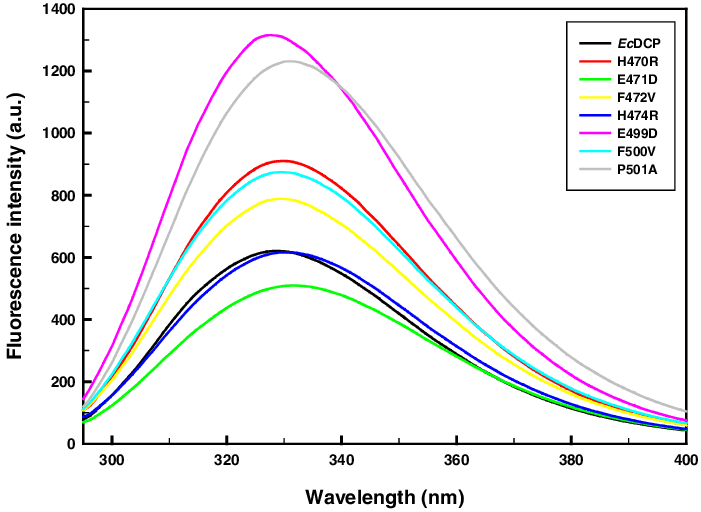Glycoprotein Intrinsic Tryptophan Fluorescence (ITF) Analysis Service
- Structural Biology Research
- Drug Development
- Mutation Function Studies
- Quality Control and Stability Assessment
- Environmental Impact Studies
Glycoprotein Intrinsic Tryptophan Fluorescence (ITF) Analysis Service is a highly sensitive, label-free structure analysis service based on the natural fluorescence characteristics of endogenous tryptophan residues of glycoprotein. By monitoring the intensity, wavelength and lifetime changes of tryptophan emission spectrum, the service can reflect the conformational dynamics of glycoproteins in real time under glycosylation modification, ligand binding, amino acid mutations or environmental changes. This service does not require additional fluorescent probes to avoid interference with the native structure of proteins. It is suitable for a variety of scientific research and industrial application scenarios such as glycoprotein conformation research, drug binding analysis, stability evaluation and quality control.
In protein science and glycobiology, glycoproteins have drawn significant attention due to their critical roles in cell signaling, immune regulation, molecular recognition, and disease progression. Glycosylation not only affects the spatial conformation and stability of glycoproteins but also alters their functional properties and interaction modes with ligands. Tryptophan, serving as a natural fluorescence probe, is highly sensitive to changes in its local microenvironment, and its emission characteristics can shift with variations in glycosylation patterns, structural rearrangements, or external conditions. ITF analysis capitalizes on this principle, providing researchers with a high-sensitivity, label-free, real-time approach for monitoring glycoprotein conformations and dynamic changes. With advancements in biopharmaceuticals, structural biology, and precision medicine, ITF analysis has emerged as an important tool for elucidating glycoprotein structure-function relationships, ensuring quality consistency of bioproducts, and streamlining drug development processes.
Services at MtoZ Biolabs
MtoZ Biolabs offers Glycoprotein Intrinsic Tryptophan Fluorescence (ITF) Analysis Service to precisely capture structural and dynamic changes in glycoproteins under conditions such as glycosylation modifications, amino acid mutations, ligand binding, or external perturbations. This service not only helps researchers elucidate the mechanisms underlying glycoprotein conformational changes but is also applicable to drug-binding analysis, mutation function validation, stability assessment, and process optimization, providing reliable data support for molecular design and quality consistency control.
Analysis Workflow
The general workflow for Glycoprotein Intrinsic Tryptophan Fluorescence (ITF) Analysis Service is as follows:
1. Sample Preparation
Glycoprotein samples undergo buffer exchange, purity verification, and concentration determination to ensure the absence of fluorescent contaminants and compatibility with fluorescence measurements.
2. Fluorescence Spectrum Acquisition
Intrinsic tryptophan fluorescence emission spectra are recorded under specific excitation wavelengths, documenting the emission peak position and intensity.
3. Environmental Sensitivity Assessment
Changes in tryptophan fluorescence peak position and intensity are monitored under varying conditions such as pH, temperature, ionic strength, or ligand addition to evaluate conformational changes and microenvironment effects.
4. Data Analysis and Reporting
Spectral data are processed through baseline correction, normalization, and peak analysis. Changes are interpreted in conjunction with structural or glycosylation data. A comprehensive report is generated, including raw spectra, analysis charts, and professional interpretations.

Lo HF. et al. Biologia. 2010.
Figure 1. Intrinsic Tryptophan Fluorescence Emission Spectra of Wildtype and Mutant Enzymes.
Service Advantages
Advanced Analysis Platform: MtoZ Biolabs established an advanced Glycoprotein Intrinsic Tryptophan Fluorescence (ITF) Analysis Service platform, guaranteeing reliable, fast, and highly accurate analysis service.
Label-Free Detection: Utilizes intrinsic tryptophan fluorescence signals, eliminating the need for external labels and avoiding interference with native protein structures.
Broad Applicability: Suitable for a wide range of glycoproteins, including membrane proteins, antibodies, enzymes, and receptors.
Dynamic Monitoring: Enables real-time tracking of conformational changes and allosteric regulation processes.
Customized Solutions: Tailors spectral techniques and optimized detection conditions to specific research objectives and sample characteristics.
Sample Submission Suggestions
Sample Types
MtoZ Biolabs accepts various sample types, including purified glycoproteins, cell culture supernatants, tissue homogenates, and biological fluids.
Storage and Transportation
Store at low temperature for short term preservation or at –80 °C for long term storage. Ship on dry ice and avoid repeated freeze thaw cycles to prevent conformational changes.
It is recommended to contact the MtoZ Biolabs technical team prior to sample submission to obtain detailed and tailored guidelines for sample preparation and submission.
Applications
Examples of applications for Glycoprotein ITF Analysis Service:
Investigate glycoprotein domain organization and conformational change mechanisms.
Evaluate the impact of candidate drugs on target glycoprotein conformation.
Analyze structural differences caused by glycosylation pattern variations or amino acid mutations.
Detect structural consistency and stability of glycoproteins across production batches.
Assess the effects of pH, temperature, and other environmental factors on glycoprotein structure.
Related Services
Glycoprotein Circular Dichroism (CD) Analysis Service
Glycoprotein Differential Scanning Calorimetry Analysis Service
How to order?







